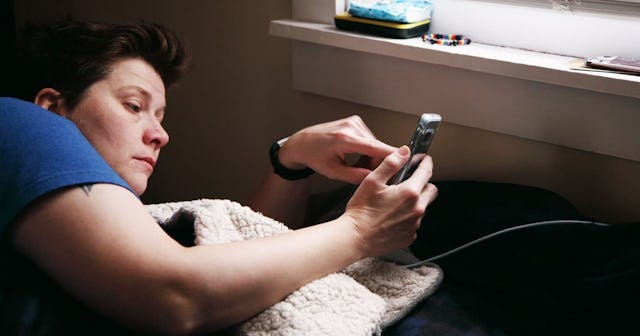Allostatic Load Might Explain The ‘Brain Fog’ Many Of Us Are Experiencing Right Now

I don’t know about you, but lately I spend a lot of time staring out the window. Under normal circumstances, I am not a stare-out-the-window kind of person. I’m a get-shit-done kind of person. I have a detailed to-do list and I tackle it with a vengeance. I thrive on going and doing, and I prefer a too-full plate to a too-empty plate. At least I used to.
These days I find it hard to get some of the most basic tasks done. There’s less rushing around to do, but I feel busier than ever. Not necessarily because I have more to do, but because everything seems to take five times as long as it used to.
All that so-called “free time” that came along with social distancing and cancelled plans is now jam-packed with fretting, worrying, and wondering what the hell is going on. And of course, all that staring out the window.
While we’re slowly adjusting to this “new normal,” some days (most days?) I still feel like I’m in a constant daze. I’m confused and exhausted. I have no idea what day it is or what I should be doing. Sure, I could help my husband organize the garage or do an online yoga class. But I can’t focus on where the kids’ sports equipment and gardening tools should go, and I despise yoga.
While some people are busy planning Zoom happy hours and game nights, I’m slogging through the daily grind. I’m just barely getting done in a day what I used to get done before noon. I feel slow, off-kilter, and generally out of sorts.
As much as I feel alone in this struggle – especially when social media is flooded with folks sharing their quarantine plans to get fit, learn a new skill, and bake a shit ton of bread – I suspect I’m not the only one feeling stuck physically, mentally, and emotionally.
Turns out, this exhausted-while-seemingly-doing-nothing feeling actually has a name too – allostatic load.
Simply put, allostatic load is the wear and tear on our bodies due to constant stress. And while staying at home and binging on Outer Banks and Never Have I Ever might not feel like constant stress, a pandemic and its resulting lockdown definitely count as “stress.” As experts point out, humans are pack animals with an inherent need to socialize. Being together helps us feel less vulnerable, and social isolation forces the brain to function on high alert more often – maybe even all the time – from perceived threats.
Nancy Sin, assistant professor of psychology at the University of British Columbia, explained to Vice that the coronavirus pandemic has increased our stress hormones on a constant, baseline level.
“We’re having a lot of these physiological adaptations, each time we feel stressed, each time we feel worried,” Sin said. “And over time, these repeated hits, physiologically and psychologically, can accumulate.”
The accumulation of stress hormones results in allostatic load – a fancy way of referring to that exhausted, out-of-sorts feeling we have due to the toll repeated stress has on our bodies.
Social isolation alone – not to mention the actual threats to our health and job security that the pandemic has caused – is enough to cause physical stress on the body.
“That’s really important in terms of the body’s assessment of risk, because being alone means you’re much more vulnerable to threats,” George Slavich, director of the Laboratory for Stress Assessment and Research at UCLA, told Vice. “Your brain needs to be on high alert to make sure that you quickly identify any threats in the environment, because you’re compromised.”
Throw in excessive worrying and the anxiety caused by simply leaving your house to get groceries and our bodies are being asked to do a lot. Sure, it might not be the kind of physical strain that comes from training for a marathon or pulling an all-nighter to meet a deadline, but it’s a physical toll nonetheless.
So, what can we do about this brain fog and exhaustion?
Well, psychologists recommend acknowledging our feelings, without judgment. As my kids learned in their social-emotional learning class this week, we need to name our feelings. I, for one, am lost, angry, unmotivated, scared, exhausted, and confused AF.
Experts also recommend things like staying active, getting sleep, and eating healthy. Which, of course, is easier said than done when you’re wide awake between 3 and 5 a.m., have strange as hell dreams, and you’ve incorporated a second breakfast into your daily routine.
Personally, I prefer this spot-on (albeit non-expert) advice, shared by Andrea Gawrylewski in Scientific American: “It’s a time for non-judgment, leeway for extra emotions, extra naps and extra ice cream. Whatever helps you feel less afraid, tired and lonely, do that. And do it again.”
So with that in mind, if you’ll excuse me, I’m off to have my daily cry, gorge myself on some cookie dough, and stare out the window for a bit.
This article was originally published on